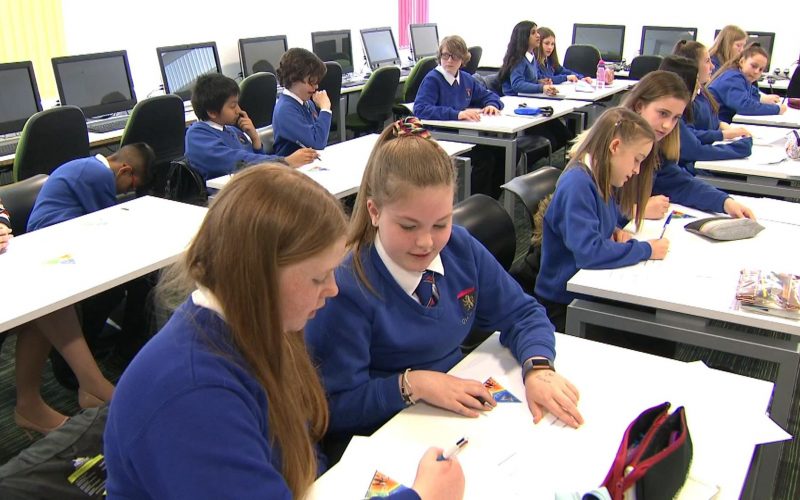Since education in Wales is a delegate subject, the Welsh Government is in charge of establishing policy and supervising implementation.
A child starts full-time primary school at age four, moves on to secondary school at age eleven, and sits for their GCSEs at age sixteen. Young people then have the choice to either enroll in further education or continue their studies at school to study for their A-levels.
The Welsh education system is similar to the English system in many ways, but there are also some key differences.
There are numerous school options available in the Welsh education system. The kind of school that parents think will best meet their child’s needs is up to them.
The Welsh Government is committed to providing all students with a high-quality education, regardless of their background or ability.
Table of Contents
- About Education in Wales
- What are the Types of Schools in Wales?
- Welsh Medium Schools
- Bilingual Schools
- Selection Schools
- What is the Welsh education board?
- Do Wales have a national curriculum?
- Structure of the Welsh Education System
- What is the Wales School System rating?
- Are GCSEs and A-Levels studied in Wales?
- When does compulsory education end in Wales?
- Is the Welsh education system the same as in England?
- FAQs
- Conclusion
- References
- Recommendations
About Education in Wales
Education in Wales is compulsory for children aged 5 to 16 years old. It is largely state-funded and free at the point of use. The Welsh Government is responsible for the overall direction and management of education in Wales, while local authorities are responsible for the day-to-day running of schools.
Compulsory education in Wales ends at the age of 16. Children are required to attend school for at least 38 weeks each year.
The Welsh National Curriculum sets out the standards that all pupils should reach in each subject area. However, schools have some flexibility in how they deliver the curriculum.
All schools in Wales are required to teach Welsh as a first or second language. The Welsh Government has set a target for all pupils to be able to speak, read, and write Welsh to a good standard by the time they leave primary school.
Also: How Long is Sixth Form in the UK? A Guide To Private Sixth Form In The UK
What are the Types of Schools in Wales?
There are four main types of schools in Wales:
- Community schools: These are schools that are owned and run by the local authority.
- Voluntary controlled schools: These are schools that are run by a voluntary organization, but they are funded by the local authority.
- Voluntary aided schools: These are schools that are run by a voluntary organization, but they have more financial and policy independence than voluntary controlled schools.
- Foundation schools: These are schools that are owned by a charitable foundation. They have more freedom to change the way they operate than other types of schools.
In addition to these four main types of schools, there are also a small number of special schools and independent schools in Wales.
Welsh Medium Schools
There are a variety of Welsh medium schools in Wales, including Welsh medium primary schools, Welsh medium secondary schools, and Welsh medium special schools.
Welsh medium schools offer a full curriculum through the medium of Welsh. This means that all subjects are taught in Welsh, including English.
Parents have a right to choose whether their child attends a Welsh medium school or an English medium school.
Bilingual Schools
There are also several bilingual schools in Wales. Bilingual schools offer a curriculum that is taught through both Welsh and English.
Bilingual schools can be either Welsh medium schools that also offer English medium classes, or English medium schools that also offer Welsh medium classes.
Parents can choose which type of bilingual school their child attends.
Also Read: How To Write Fast In Exam: A Quick Guide To Write Faster During Exams
Selection Schools
There are a small number of selection schools in Wales. Selection schools select their pupils based on academic ability or aptitude.
Selection schools are typically grammar: schools, but there are also some other types of selection schools, such as music schools and sports schools.
Parents can apply for their child to attend a selection school, but there is no guarantee that their child will be admitted.
Other Types of Schools
In addition to the four main types of schools listed above, there are also several other types of schools in Wales, including:
- Special schools: Special schools cater for pupils with special educational needs.
- Independent schools: Independent schools are not funded by the government. They charge fees for pupils to attend.
- Free schools: Free schools are independent schools that are funded by the government.
What is the Welsh education board?
The Welsh education board is called Estyn. It is an independent inspection body that reports to the Welsh Government on the quality of education in Wales. Estyn inspects all schools in Wales, including primary, secondary, special, and independent schools.
The Welsh Government is committed to improving the Wales School System. It has introduced several reforms in recent years, including the Curriculum for Wales, the Foundation Phase, and the 32+ program. The Welsh Government is also working to improve the quality of teaching and learning in schools.
It is too early to say what the long-term impact of these reforms will be. However, the early signs are positive. For example, the number of schools in Wales that are rated “green” by Estyn has increased in recent years. This suggests that the Wales School System is on the right track.
Read Also: Do You Have to Pass English Literature? What’s Most Important in 2023
Do Wales have a national curriculum?
Yes, Wales has a national curriculum called Curriculum for Wales. It is a framework that sets out the knowledge, skills, and understanding that all students in Wales should learn at each stage of their education.
The Curriculum for Wales is taught in all schools in Wales, regardless of whether they are state-funded or independent.
The Welsh Government has recently introduced a new curriculum for Wales, which was rolled out in September 2022. The new curriculum is more child-centered and focuses on developing pupils’ skills and knowledge in six key areas:
- Expressive arts
- Health and well-being
- Humanities
- Languages, literacy and communication
- Mathematics and numeracy
- Science and technology
Structure of the Welsh Education System
The Welsh education system is divided into three main phases:
- Early years education: This covers children from birth to the start of primary school. Early years education is not compulsory, but it is free for all three- and four-year-olds.
- Primary education: This covers children from the start of primary school to the age of 11.
- Secondary education: This covers children from the age of 11 to 16.
After the age of 16, pupils have several options available to them. They can stay on at school to study A-levels or other post-16 qualifications. They can also choose to go to college or university or to start an apprenticeship.
Read: What Time Do Primary Schools Start and Finish in the UK?
What is the Wales School System rating?
The Wales School System rating is difficult to assess, as there is no single international ranking system for school systems. However, some factors suggest that the Wales School System is performing well.
For example, Wales consistently performs well in international assessments of student achievement, such as PISA and TIMSS. Additionally, Wales has a high rate of school pupils achieving five or more good GCSEs at grade 4 or above.
However, there are also some areas where the Wales School System could improve. For example, some schools in Wales are struggling to meet the standards set out in the Curriculum for Wales. Additionally, some pupils in Wales are not achieving their full potential.
Overall, the Wales School System is performing well, but there is still room for improvement.
Here are some specific examples of the Wales School System’s strengths and weaknesses:
Strengths:
- Wales consistently performs well in international assessments of student achievement.
- Wales has a high rate of school pupils achieving five or more good GCSEs at grade 4 or above.
- Wales has a strong commitment to Welsh language education.
- Wales has several innovative schools that are leading the way in educational reform.
Weaknesses:
- Some schools in Wales are struggling to meet the standards set out in the Curriculum for Wales.
- Some pupils in Wales are not achieving their full potential.
- There is a need to improve the quality of teaching and learning in some schools.
- There is a need to reduce the attainment gap between different groups of pupils.
Are GCSEs and A-Levels studied in Wales?
GCSEs (General Certificate of Secondary Education) are qualifications that are typically taken by students in Year 11 (aged 15 or 16) in Wales. They are a broad range of qualifications that cover a variety of subjects, including English, Maths, Science, Welsh, and a range of other optional subjects.
A-Levels (Advanced Level qualifications) are qualifications that are typically taken by students in Year 12 and 13 (aged 16 or 17) in Wales. They are more specialized than GCSEs and are designed to prepare students for university study or other higher education courses.
See Also: How Long Are A-Level Exams?
When does compulsory education end in Wales?
Compulsory education in Wales ends at the end of the school year in which the student turns 16. This means that students in Wales can leave school on the last Friday in June, as long as they will be 16 by the end of that school year’s summer holidays.
However, it is strongly encouraged that students continue their education beyond the age of 16. The Welsh Government has a target that 90% of young people in Wales should be in education, employment, or training by the age of 18.
There are a variety of post-16 education options available in Wales, including A-Levels, vocational qualifications such as BTECs and apprenticeships, and further education courses.
Is the Welsh education system the same as in England?
The Welsh education system is similar to the English education system, but there are some key differences. For example, GCSEs in Wales are linear, meaning that all exams are taken at the end of the course. In England, GCSEs can be either linear or modular.
Another difference is that the Welsh Government has introduced a new curriculum called the Curriculum for Wales. This curriculum is designed to be more flexible and tailored to the needs of individual learners.
Overall, the Welsh education system is a high-performing system that provides learners with a good foundation for future success.
Here is a table summarizing the key differences between the Welsh and English education systems:
| Characteristic | Welsh education system | English education system |
| Compulsory education age | 16 | 16 |
| GCSEs | Linear | Linear or modular |
| Curriculum | Curriculum for Wales | National Curriculum |
| Other qualifications | Welsh Baccalaureate, Vocational qualifications | Apprenticeships, other vocational qualifications |
It is important to note that these are just some key differences between the two systems. Many other factors can affect a learner’s experience of education, such as the school they attend and the individual teachers they have.
Read More: When is the Student Finance Application Deadline in the UK?
FAQs
A high-quality education at a relatively low cost
A strong focus on the Welsh language
A welcoming and supportive environment
Special schools
Independent schools
Free schools
All counties in Wales provide instruction in Welsh. In these schools, Welsh is the primary language spoken in both the classroom and the playground. In Welsh, your child will learn and interact with others. There is plenty of support available to assist with schooling, so don’t worry if you don’t understand the language.
Wales has worse post-16 educational outcomes than the rest of the UK, with a higher percentage of youth not in school, work, or training (11% vs. 5-9%), lower levels of participation in higher education (especially for boys), and lower employment and earnings for those who do not pursue further education.
Conclusion
Their education system is committed to providing all pupils with a high-quality education. The Welsh Government is investing heavily in education, and there are several initiatives underway to improve the performance of schools and to raise standards.
The new curriculum for Wales is one of the most significant changes to the education system in many years. The new curriculum is designed to prepare pupils for the challenges of the 21st century and to help them develop the skills and knowledge they need to succeed in life.
References
- thinkstudent.co.uk _____ What is the Welsh Education System?
- en.wikipedia.org ______ Education in Wales
- news.sky.com _____ Schools in Wales to replace traditional subjects




